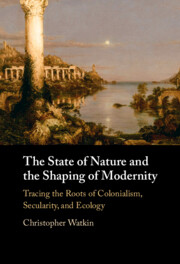Refine search
Actions for selected content:
29 results
Introduction
-
- Book:
- The State of Nature and the Shaping of Modernity
- Published online:
- 19 November 2025
- Print publication:
- 18 December 2025, pp 1-24
-
- Chapter
- Export citation
1 - What Is the State of Nature?
- from Part I - Making Sense of the State of Nature
-
- Book:
- The State of Nature and the Shaping of Modernity
- Published online:
- 19 November 2025
- Print publication:
- 18 December 2025, pp 27-74
-
- Chapter
- Export citation

The State of Nature and the Shaping of Modernity
- Tracing the Roots of Colonialism, Secularity, and Ecology
-
- Published online:
- 19 November 2025
- Print publication:
- 18 December 2025
Family and Moderation in Locke’s State of Nature
-
- Journal:
- Utilitas , First View
- Published online by Cambridge University Press:
- 05 November 2025, pp. 1-17
-
- Article
-
- You have access
- Open access
- HTML
- Export citation
Defending the Juridical
-
- Journal:
- Canadian Journal of Law & Jurisprudence , First View
- Published online by Cambridge University Press:
- 03 October 2025, pp. 1-21
-
- Article
-
- You have access
- Open access
- HTML
- Export citation
Chapter 9 - Rousseau and Inequality
-
- Book:
- The Social Contract
- Published online:
- 30 May 2025
- Print publication:
- 04 September 2025, pp 105-113
-
- Chapter
- Export citation
Chapter 2 - Thomas Hobbes, Born with Fear
-
- Book:
- The Social Contract
- Published online:
- 30 May 2025
- Print publication:
- 04 September 2025, pp 13-28
-
- Chapter
- Export citation
Chapter 3 - Receptions of Leibniz
-
- Book:
- Freedom and Perfection
- Published online:
- 25 July 2025
- Print publication:
- 14 August 2025, pp 58-82
-
- Chapter
- Export citation
Chapter 9 - States of Nature as Theories of Normativity
-
-
- Book:
- Kant's Lectures on Political Philosophy
- Published online:
- 18 July 2025
- Print publication:
- 07 August 2025, pp 161-178
-
- Chapter
- Export citation
7 - The New View and its Provenance
- from Part IV - A New View of Liberty
-
- Book:
- Liberty as Independence
- Published online:
- 23 January 2025
- Print publication:
- 06 February 2025, pp 173-197
-
- Chapter
- Export citation
Nomads, Territory, and the Kantian State
-
- Journal:
- Kantian Review / Volume 30 / Issue 2 / June 2025
- Published online by Cambridge University Press:
- 19 December 2024, pp. 163-177
- Print publication:
- June 2025
-
- Article
- Export citation
Chapter 9 - The global expansion of international society
- from Part 2 - International history
-
-
- Book:
- An Introduction to International Relations
- Published online:
- 31 August 2024
- Print publication:
- 12 August 2024, pp 122-135
-
- Chapter
- Export citation
2 - The Permissibility of Punishment
-
- Book:
- The Right to Punish
- Published online:
- 16 May 2024
- Print publication:
- 23 May 2024, pp 20-46
-
- Chapter
- Export citation
2 - Anarchy and the State of Nature in Donald Trump’s America and Adolf Hitler’s Germany
- from Part I - Strategic Thinking about Fascism
-
-
- Book:
- Fascism in America
- Published online:
- 14 September 2023
- Print publication:
- 14 September 2023, pp 78-106
-
- Chapter
- Export citation
Chapter 8 - Shedding New Light on Thomas Hobbes’s Leviathan (1651)
- from Part III - Seventeenth- and Eighteenth-Century Plutarch
-
- Book:
- Plutarch's Prism
- Published online:
- 22 September 2022
- Print publication:
- 29 September 2022, pp 293-317
-
- Chapter
- Export citation
1 - Escape to Lake Bienne
-
- Book:
- Tyranny and Revolution
- Published online:
- 28 May 2022
- Print publication:
- 19 May 2022, pp 7-39
-
- Chapter
- Export citation
8 - Kissinger, Spinoza, and Genghis Khan
-
-
- Book:
- The Cambridge Companion to Spinoza
- Published online:
- 14 October 2021
- Print publication:
- 28 October 2021, pp 309-334
-
- Chapter
- Export citation
3 - Liberalism
-
- Book:
- Foundations of American Political Thought
- Published online:
- 09 July 2021
- Print publication:
- 29 July 2021, pp 49-90
-
- Chapter
- Export citation
Role and relation in Confucian IR: Relating to strangers in the states of nature
-
- Journal:
- Review of International Studies / Volume 48 / Issue 5 / December 2022
- Published online by Cambridge University Press:
- 29 June 2021, pp. 910-929
- Print publication:
- December 2022
-
- Article
-
- You have access
- Open access
- HTML
- Export citation
4 - Law
-
- Book:
- Space and Fates of International Law
- Published online:
- 20 August 2020
- Print publication:
- 17 September 2020, pp 88-126
-
- Chapter
- Export citation
